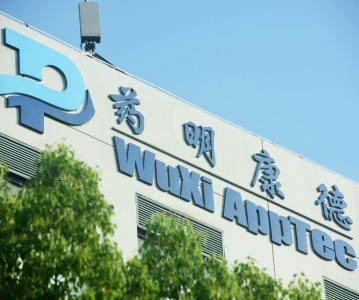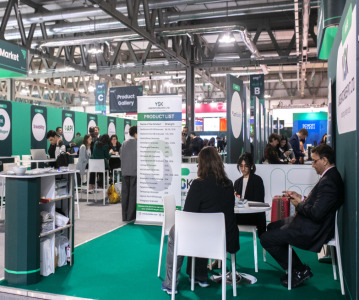Austrian Centre of Industrial Biotechnology and GE Healthcare establish a cell line engineering collaboration
Partnership to explore and identify new tools and methods to modify and optimize the CHO cell line performance.
The Austrian Centre of Industrial Biotechnology (acib) and GE Healthcare are introducing a cell line engineering research collaboration to bring increased productivity to biomanufacturers. The goal of the 3-year partnership is to explore and identify new tools and methods to modify and optimize the Chinese hamster ovary (CHO) cell line performance. Cell lines are the most important single component in the production of biopharmaceuticals, as they set the boundaries for the product yield and quality resulting from a biomanufacturing run.
CHO cell lines, the most commonly used hosts for industrial production of therapeutic proteins, have not traditionally received much direct attention or optimization in the industry, because the technical means have been limited, and the regulatory environment is demanding. Currently, biopharmaceutical companies are mainly using time-consuming empirical, trial and error methods to find the most optimal production cell clone for their product starting from sub-optimal starter cell lines. However, with the newly available opportunities introduced by gene editing and analytical tools, it has become possible to explore how cells behave and respond to different process conditions, and develop improved starter cell lines accordingly.
“With the new analytical tools that genome sequence information along with different –omics technologies (such as transcriptomics) provide, we begin to understand precisely how cellular performance is regulated and how it works in detail. What we are aiming for in this collaboration is to develop the ability to manipulate cell behavior in an efficient way, such that we can design, define and control these properties and adapt them to whatever is best suited for a given product,” said Prof. Nicole Borth of BOKU University, Area Leader at acib and in charge of the project.
GE Healthcare and acib will seek to reduce the need for clone screening, recognize suitable tools for cell line engineering, and gain more knowledge about what cellular mechanisms determine cell line efficiency. In the first phase, the collaboration focuses on performing basic research in this area, but in the long-term the work could lead to creation of a pre-engineered host cell line library, where biopharma producers could choose the most suitable cell line to use in the production of any specific biopharmaceutical to ensure higher productivity with increased speed and final product quality.
“While the biopharma industry is growing quickly, lack of access to biologic drugs is commonplace in many countries partly due to the complex and time-consuming production methods. Cell line engineering could help us bring major productivity improvements for our customers, making it more feasible to bring biologic manufacturing to more regions. Acib has already conducted some remarkable research in this field, and we believe that this collaboration will increase our understanding of cellular behavior, eventually creating more predictable and reliable manufacturing processes for our customers, biopharma producers,” said Morgan Norris, General Manager, Upstream and Cell Culture, GE Healthcare Life Sciences.
Related News
-
News WuXi to sell CGT manufacturing unit to US-based Altaris LLC
At the tail end of 2024, Chinese-based CDMO WuXi AppTec announced the signing of their deal with private equity firm Altaris LLC, confirming the sale of WuXi Advanced Therapies, the cell and gene therapy manufacturing arm of WuXi AppTec. -
News Women in Pharma: Our hopes for 2025 and beyond
Our last instalment for 2024 of the Women in Pharma series brings you messages direct from the Informa Markets CPHI team as they discuss the advice and insights they have carried throughout their roles working at CPHI, and what they hope to see for the... -
News CPHI Milan Wrap-Up Report: Conference Highlights
Discover the emerging and trending topics of the pharmaceutical industry with our CPHI Milan Conference Highlights, with exclusive insight from pharmaceutical leaders and experts! -
News BIOSECURE Act not included in key defense spending bill for 2025
On December 7, 2024, the Biden administration revealed the 2025 National Defense Authorization Act, an annual defense bill specifying the budget and expenditures of the US Department of Defense. The controversial BIOSECURE Act was notably missing from ... -
News Lessons from CPHI Milan 2024: Sunny Intervals for Pharma Manufacturing?
As the 2024 CPHI conference wrapped up in Milan, we caught up with L.E.K. Consulting – a global strategy consulting firm with deep expertise in pharma manufacturing – to discuss evolving market perspectives and business outlook. -
News Trump 2.0: What does the US election result mean for the healthcare industry?
After Trump won the Presidential election in the US in early November, we take a look at some of the implications a new Trump administration could have on the health and pharmaceutical industry, and on US patients. -
News Women in Pharma: Reflections from Behind the Scenes
In this instalment of our monthly series, the team that brings you the Women in Pharma series each month sits down for a heart-to-heart on what the series means to them, and how they hope to continue their work in the future. -
News Scaling the Industry: CPHI Scale-Up Market interview with YSK Laboratories
For the first time, CPHI Milan hosted the CPHI Start-Up Market, expanding support for emerging and small-sized enterprises in their transition to the next level of growth. In this interview, we spoke with Yuvansh Khokhani, Managing Director of YSK Labo...
Position your company at the heart of the global Pharma industry with a CPHI Online membership
-
Your products and solutions visible to thousands of visitors within the largest Pharma marketplace
-
Generate high-quality, engaged leads for your business, all year round
-
Promote your business as the industry’s thought-leader by hosting your reports, brochures and videos within your profile
-
Your company’s profile boosted at all participating CPHI events
-
An easy-to-use platform with a detailed dashboard showing your leads and performance

.png)





